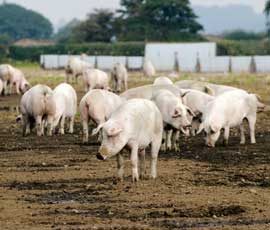Evaluate pig destocking decisions carefully

Pig producers weighing up whether to continue in production are urged to continually assess their finances before making any decision.
Rising feed costs and a continued gap between the cost of production and the Deadweight Average Pigs Price (DAPP) mean producers are losing up to £14 on every finished pig.
The national herd is already falling – in July and August an additional 7,600 sows were culled in England (13% more than August 2011). As a result, BPEX recently published guidance on strategic destocking for financial reasons.
Within that guidance, producers are advised to consider selling or renting out units as a going concern, before going down the path of depopulation.
Destocking tips
- Be honest and upfront with all in supply chain
- Continually assess finances
- Hold regular meetings with bank manager or financial adviser
- Keep staff informed throughout
- Thoroughly disinfect after destocking
- Wean and finish all piglets if possible
- Cull in-pig sows only as last resort
- Research renting out units or contract rearing/finishing for third parties
Throughout the process, all staff should be kept informed and the timing of redundancies or notices will need to be carefully planned.
“If the cost of production is about 170p/kg and the DAPP remains below that, anyone with borrowings or an overdraft will be forced to make a decision on whether or not to partially or full destock,” said Farmers Weekly pig industry commentator Peter Crichton.
Producers needed to continually assess their finances and be honest and upfront from the outset with everyone in the chain – bank manager, feed merchant, consultant, contractor, said Mr Crichton.
“When the overdraft reaches a limit, a decision about your future is then forced upon you.
“All producers need to have regular monthly, or twice-monthly, meetings with their bank manager or a financial adviser to look at their overdraft position.”
Producers considering partial destocking must ask themselves whether or not this will make a difference financially – often fixed costs will remain the same.
“A significant number of contracts are three and six months long, but in many cases if it’s uneconomical to produce pigs you have to say to the abattoir that you have to cut or end production,” said Mr Crichton.
“You have to give them notice; I have not been aware of any legal situations arising from this. The processors will just have to understand.”
Producers opting for a complete depopulation should wean and finish all piglets if possible and only cull in-pig sows as a last resort. If you plan on restocking in the future, ensure units are thoroughly cleaned, added Mr Crichton.
“Look at options to rent the units out or contract rear and finish for third parties.”
For a downloadable copy of BPEX guidance on strategic restocking go to the BPEX website and click on Feed Crisis. Producers can also call 0247 647 8792 or email kt@bpex.ahdb.org.uk to get further support and advice.
UK pig industry calls for transparent pricing
